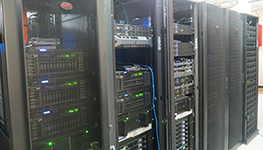Science and technology
Africa's fastest computer revealed
The Department of Science and Technology's Dr Thomas Auf der Heyde said high performance computing contributed to economic growth. "For our country to grow at the required rate, as set out in the National Development Plan, it needs to change gear by building capacity in the production and dissemination of knowledge… High performance computing and advanced data technologies are powerful tools in enhancing the competitiveness of regions and nations," he said. Science and Technology Minister Naledi Pandor congratulated the CSIR and the CHPC for "this quantum leap in support of South African science, especially data-intense research programmes like the Square Kilometre Array (SKA)". "The launch of this peta-scale computing facility in South Africa is evidence, again, of our determination to be globally competitive in certain areas of science and to make the necessary investments, and of the competence of South African scientists and engineers to develop, implement and maintain such cutting-edge technologies," she added.Welcome the fastest machine on the continent of Africa. One petaflop Lengau: https://t.co/nGWirZr7N2 #DellPowerEdge pic.twitter.com/fuqzGeymok
— Dell (@Dell) June 7, 2016
Benefits
Dell is collaborating with the CSIR on the project. "The Lengau system will provide access and open doors to help drive new research, new innovations and new national economic benefits," said Jim Ganthier, the vice-president and general manager of Dell. The computer gave scientists an opportunity to conduct their research locally without having to travel abroad for higher performance computing infrastructure, said Dr Happy Sithole, the director of the CHPC. It was approximately 40 000 times faster than the normal Dell i3 processor laptop used by many South Africans at home and at work, Sithole added. According to the CSIR there are many advantages for scientists:- Increased access to computer resources for users who previously had limited or no access to such resources owing to capacity constraints;
- Improved performance of large-scale simulations that were impossible in the past, opening completely new avenues of research; and,
- Greater capacity to build the private sector/non-academic user base of the CHPC for improved national economic benefit.
#CHPC enables researchers to achieve scientific results and to seek a competitive edge in fields like #astronomy #medicine & #energy. #CSIR
— CSIR (@CSIR) June 7, 2016
Already in use
The computer has already been put to good use in research in climate modelling by the CSIR, bioinformatics by the University of Cape Town, material science by the University of Limpopo, and astronomy by South Africa's SKA office. Mary Jane Bopape, a researcher at the CSIR, said the new system had reduced research times on climate modelling, from up to three hours to just under 30 minutes. "With the new system, we have a lot more processors than we had before. With that, we are able to make simulations quicker. The climate change simulations you make are supposed to run over a long time," she said. South Africa.info reporter The CSIR unveils the Lengau system on 7 June 2016. It is the fastest computer on the continent. (Image: supplied)
The CSIR unveils the Lengau system on 7 June 2016. It is the fastest computer on the continent. (Image: supplied)
Related links
Related articles
- Naledi Pandor awarded Germany's Grand Cross of Merit
- Bringing brain science to winemaking: SA's world-first 'neurowine'
- Africans on Time magazine's 2016 100 Most Influential list
- South African school science project takes on maize toxins
- South African teen is world's top maths student
- South Africa's first hydrogen fuel cell forklift
- New planetarium opens in South Africa
- South Africa's CSIR displayed advancements at Scifest




